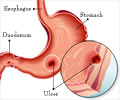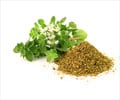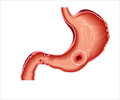How is H. pylori peptic ulcers treated?
"The treatment consists essentially in accurately protecting the ulcer from gastric juice corrosion until healing of the ulcer takes place." -Bertram Welton Sippy, 1915
H. pylori infections are usually treated by a combination of drugs, those that kill the bacteria and drugs which, reduces stomach acid thereby protecting the stomach lining.
Antibiotics like Metonidazole, Tetracycline, Clarithromycin and amoxicillin are drugs commonly used to kill the bacteria.
Two types of acid-suppressing drugs are used against H. pylori they are - H2 blockers and proton pump inhibitors.
Histamine, which stimulates acid secretion, is blocked by H2 blockers. Some commonly used H2 blockers are: Cimetidine, ranitidine, famotidine and nizatidine, these drugs also help reduce ulcer pain.
Proton pump inhibitors like, Omeprazole, lansoprazole, rabeprazole, esomeprazole, pantoprozole are used to suppress acid production by halting the mechanism that pumps the acid into the stomach.
The mild side effects of treatment are nausea, vomiting, diarrhea, dark stools, metallic taste in the mouth, dizziness, headache, and fungal infections.



















